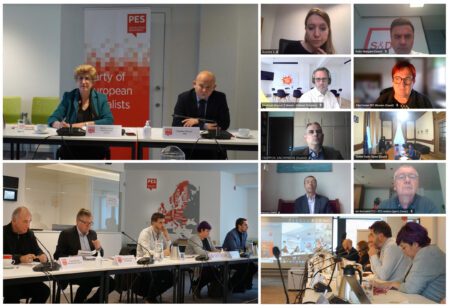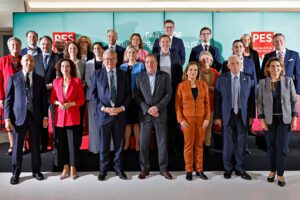More green and social investment is vital for Europe’s economic success. Member states must swiftly move forward with reform of the Stability and Growth Pact, progressive European politicians, political representatives and members of civil society urged today.
The Financial and Economy Network (FEN) of the Party of European Socialists (PES) met to exchange on the economic governance framework reform announced by European Commissioner Paolo Gentiloni and to discuss social democratic policies to address the crises facing Europe.
Chair of the PES Financial and Economic Network, and President of the Foundation for European Progressive Studies, Maria João Rodrigues said:
“The PES strongly supports a reform of the fiscal rules, a position reiterated by new PES President Stefan Lövfen in his response to the Commission announcement last month.
“Flexibility, responsibility and ownership are the core principles of what Paolo Gentiloni set out. If debt reduction plans contain sufficient room for green and social investments, European progressives can be satisfied with this first step. We urge member states to move forward with these proposals urgently so Europe can fully invest in its future economic success, including with a permanent long-term EU investment capacity.
“In the short term, we need to use all the means at our disposal, such as excess profits taxes and instruments modelled on SURE, to support families and businesses through the crises.”
Cracks in the welfare state exposed by Covid-19, the need for strategic autonomy following Russia’s brutal invasion of Ukraine, and the climate crisis, have left the EU economy facing major challenges. With more flexibility, responsibility and ownership in the EU’s Stability and Growth Pact, member states can address these challenges and create green, digital and resilient economies fit for the future, built on sustainable public finances.
Today’s FEN meeting also discussed plans to tax excess profits to support individuals and businesses through the energy crisis, particularly in the months ahead. A broad approach targeted beyond fossil-fuel companies – alongside measures to fight longstanding problems with tax evasion – would allow member states to support the most vulnerable.
These support measures could be boosted by EU funds, organised following the “SURE model” where the EU issues joint debt to finance specific measures through loans to member states. Industrial stoppages due to high energy costs remain a risk and the EU must be ready to put in place, or reactivate, measures to support jobs.
SURE – Support to mitigate Unemployment Risks in an Emergency – was a highly successful instrument put forward by PES Commissioners Paolo Gentiloni and Nicolas Schmit to support national unemployment benefit systems during the pandemic.



